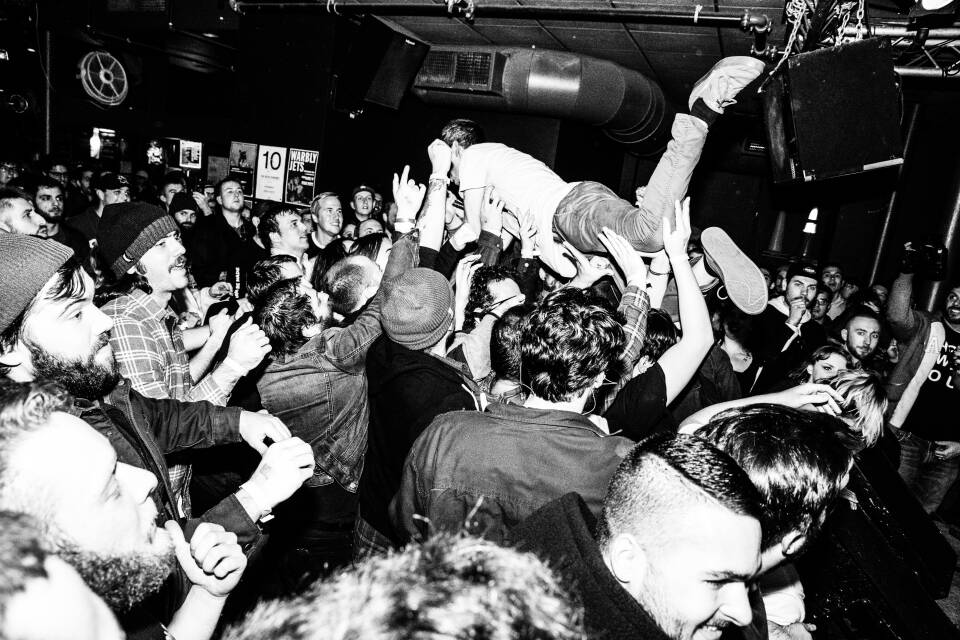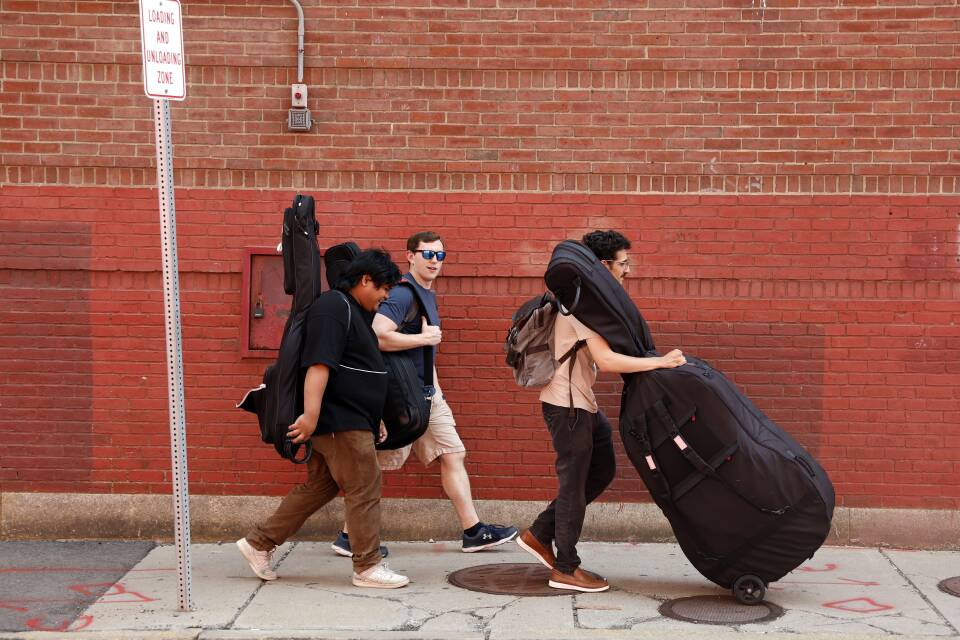World-renowned multi-instrumentalist and composer Makanda Ken McIntyre’s contribution to the world of jazz can’t be understated. His signature opening number, “Welcome,” is one of just 75 recorded compositions.
In 2001, the Boston native passed away unexpectedly from a heart attack at the age of 69. But later, his wife discovered that he left behind around 350 written compositions that hadn’t been recorded.
John Kordalewski — this week’s nominee for the Joy Beat — decided to bring them to life through the Makanda Project. One listener called it to nominate him:
“They offer free world-class jazz concerts. It’s just an amazing gem of this city that hasn’t nearly gotten the recognition it deserves. Free joy dispensed throughout the summer and into the fall and beyond.”
The Makanda Project has grown to a 13-member ensemble over the last two decades, rearranging and performing dozens of his works for the Boston area and beyond. It speaks to anyone who has gotten joy in life from music, including GBH’s All Things Considered host Arun Rath. He sat down with Kordalewski to discuss how he’s sharing Makanda Ken McIntyre’s music with the local community. What follows is a lightly edited transcript.
Arun Rath: Let’s talk about Makanda Ken McIntyre and the profound influence that he’s clearly left on you and what it was like to hear about these compositions. What made you decide to take on this project?
John Kordalewski: Well, he was the type of person that if you met him, you never forgot him. If I could just give a little history: He was kind of first known as an alto saxophonist, and this was in the early 1960s, in a period when, prior to that, everyone was pretty much playing in the style of Charlie Parker because Charlie Parker revolutionized jazz and it left such a profound influence.
Charlie Parker was his idol, but he didn’t want to sound like Charlie Parker — because he wasn’t Charlie Parker. He didn’t feel the same things that Charlie Parker felt when he was playing, because he was a different person at a different time. So his challenge was to try to find other places to take the music. At the same time, he was grounded in the kind of fundamental principles of the jazz tradition: first and foremost, that the music has to swing.
He played all these instruments; he could play the oboe and the bassoon and improvise very well on those instruments — and [instruments] that you don’t usually hear played in the jazz context. He played beautiful flute, bass, bass clarinet. I had the good fortune to study with him in the late ’70s, early ’80s, so he had a profound influence on me.
In terms of the compositions and starting the band, you know, he recorded, as you mentioned, 75 of his tunes. And there’s something a little bit different about the pieces that he wrote. They’re lyrical. They’re rhythmic. But they do different sorts of things. You can feel that there’s a kind of unique imagination behind them.
For a musician, they present challenges that are different from more conventional compositions. It just sort of intrigued me, so when I heard that there were hundreds more, I was very curious, and it just sort of happened.
We started the band in 2005 — our lead alto player and myself first just getting together — and then gradually, we started assembling a group, and it’s managed to grow.
I often wonder what his critique would be of our playing. I think he’d be very pleased that we’ve been able to build an audience for it because that was something that kind of escaped him during his lifetime, and he was always frustrated by that.
“What brings me a lot of joy is the fact that we’ve been able to build a following and build a scene in the community.”John Kordalewski, who started The Makanda Project
Rath: I’m curious, knowing his music as well as you did, as intimately as you did, before this, have there been surprises along the way? Like something that you came across in one of these tunes that was like, “Huh.”
Kordalewski: Well, I have these sheets, which is known as a lead sheet. I’ll just pick up one of them. I try to play it on the piano, and sometimes it won’t quite make sense. I’ll pick up another one, try that one. Five years later, I’ll try the one that didn’t make sense, and then it’ll hit me. It’s like, “That’s what that is!”
There are pieces we’ve been playing for 15 years that we’re still just trying to really understand, to the point where we feel we can make out of them what their potential is. It was never static with him — that this piece is supposed to be played this way. There are always different possibilities of how you can play it.
You could choose our next Joy Beat!
If you’d like to nominate someone or something for the Joy Beat, leave us a voicemail at 617-300-BEAT (2328).
Rath: With that, I mean, when you’re going from just a lead sheet to a full arrangement and scoring it for sometimes fairly large ensembles, what is that like? Are you trying to channel him in a sense? How do you make those decisions through that whole process?
Kordalewski: Well, you know the concept of a repertory band? Sort of like recreating something from the past?
Rath: Right.
Kordalewski: We’re not doing that. He would not want us to do that any more than he tried to sound like Charlie Parker. But in writing the arrangement, I know some of the things that he thought were important. Anything I can see [that] I think was his intent with the composition, I try to honor that, you know? But his music is a vehicle for us to further develop our own voices.
Rath: You know, there’s joy communicated in your music. People get that — like our caller and myself. I’m curious: for you, when you’re performing or even composing and arranging, where does it come from for you, personally? What gives you the joy that you are communicating to the rest of us through music?
Kordalewski: I don’t think anyone’s ever asked me that before. What brings me a lot of joy is the fact that we’ve been able to build a following and build a scene in the community. There’s a certain spirit at our concert that’s different from a lot of venues that you might go to. We’re not at the fanciest locations, but they’re in community-based locations, like the Roxbury branch of the Boston Public Library.
There’s a whole cross-section of people who come to the concerts, and we’re playing Makanda’s challenging music, and they’re enjoying it. [Makanda] actually said to me one time when I was doing a gig with him, and he was going to play these particular tunes that seemed to be, you know, less adventurous in their structure. He said, “People aren’t necessarily ready for some of my other stuff.” We haven’t put that kind of limit on it.
You know what I mean when I say pieces in seven? Instead of going, “one, two, three, four, one, two, three, four,” you go, “one, two, three, four, five, six, seven, one, two, three…” You know, a little off-center in terms of the rhythm. The other day, we were playing out in the church, and this little girl and her mother were just dancing to that — you know, the girl was jumping up and down excited, and she and her mother were holding hands, moving around, dancing.
It didn’t matter that it was in seven-four. Authorities would tell you that you couldn’t play that tune to a general audience because it’s in seven-four.
Rath: I guess the authorities didn’t give the audience enough credit.
Kordalewski: I think that happens a lot. I think that happens a lot.
If you’d like to make a nomination for the Joy Beat, leave us a voicemail at 617-300-BEAT (2328).









